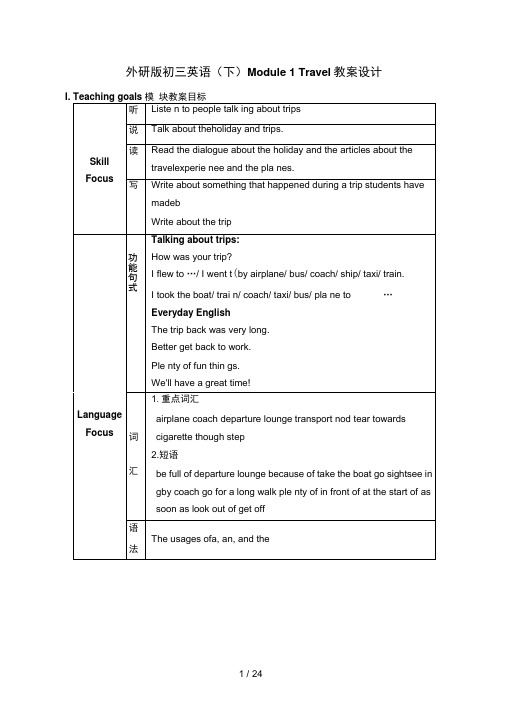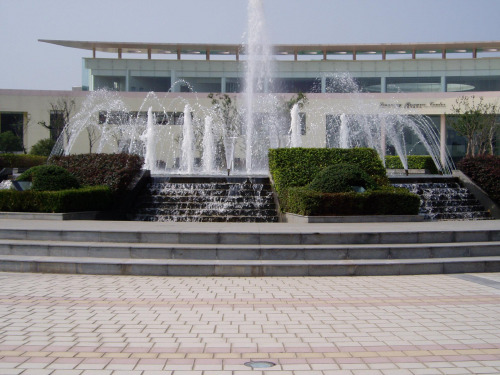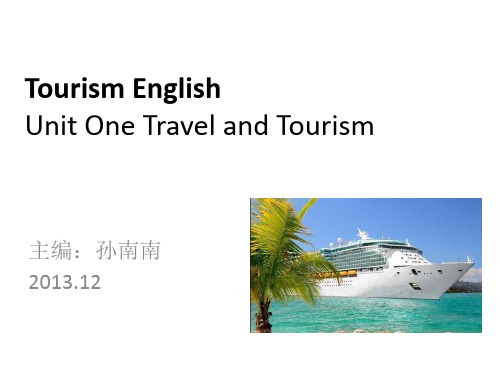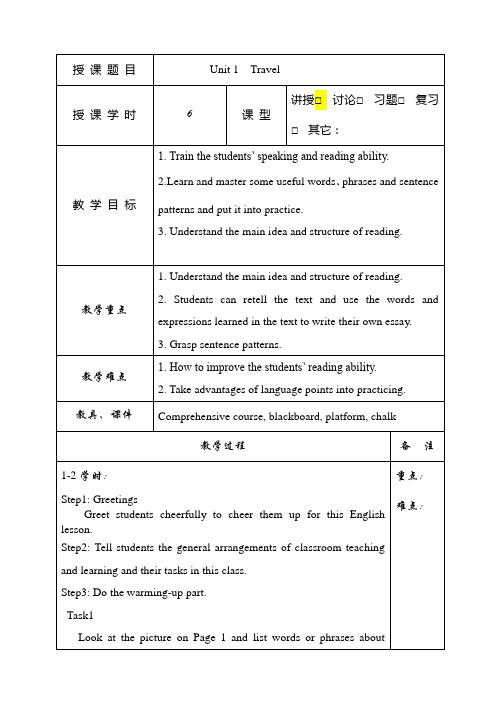Lesson 1 Travel Language
外研版初三英语(下)ModuleTravel教学设计

外研版初三英语(下)Module 1 Travel教案设计II. Teaching material analyzing 教材分析本模块以“Trave为话题,以学习谈论自己或他人的旅行为主线,介绍了旅行中发生的事件。
通过模块学习,学生将重点掌握定冠词与不定冠词的用法,并能运用所学知识介绍自己或他人的旅行经历。
Unit 1通过听、读、说训练,初步学习谈论旅行的方法。
Vocabulary and liste ningActivity 1要求利用所给的词回答问题,学习或复习一些交通工具的表达方式。
Activity 2利用所给词汇听录音回答关于旅游的问题。
Activity 3再听一遍填写表格。
Activity 4听读一段Lingling, Betty, Daming谈论各自旅行的对话,学习关于旅行的一些表达方式。
Activity 5根据对话完成表格,听对话录音核对答案。
Activity 6根据对话内容回答问题,要求对对话深入理解。
Activity 7根据对话内容完成句子,注意because, so and although, bu的用法。
Pronun ciati on and speak ingActivity 8听录音,按照意群朗读句子。
Activity 9根据意群朗读对话并听录音改正读得不对或不好的地方。
Activity 10两两活动,就彼此的旅行进行口语练习。
Unit 2通过读、写训练,学习谈论旅行途中的经历。
Reading该单元共设计了4 个活动。
Activity1 看短语猜测文章内容,读文章给句子排序。
文章介绍了Lin 的第一次坐火车旅行的经历。
Activity 2 根据文章选择最佳答案, 注意文章的细节。
Activity 3 两两活动,根据文章回答问题,加深对文章的理解。
WritingActivity 4 写下自己旅行途中的难忘经历,从而练习关于旅行文章的写作。
Unit 3 对定冠词与不定冠词及“谈论旅行”的功能工程进行综合训练:Activity 1 用a, an, the 填空。
旅行英语课件

目录
CONTENTS
01
Preparation before travel
BIG DATA EMPOWERS TO CREATE A NEW
ERA
Itinerary planning
Determine travel purpose and time
Firstly, it is necessary to clarify the purpose of the trip and plan the duration of the stay in order to better arrange the itinerary.
Travel English courseware
BIG DATA EMPOWERS TO CREATE A NEW
ERA
• Preparation before travel • Essential English for Travel • Communication skills during travel • Cultural knowledge during travel • Safety precautions during travel
Security and Customs
Waiting and boarding
Understand the rules of the waiting room, use boarding passes correctly, and board on time.
Understand the security process and customs regulations, and respond to relevant issues.
Apologies and ons
【语文版】中职英语基础模块下册:Unit 1《Travel》ppt课件(35张PPT)

V. Avoiding Cultural Taboos
• Some fundamental rules to make communication easier, and to make a trip to another country more enjoyable:
• 1.Never raise your voice
taboos?
2. What do you know about the following places?
Moscow Red Square
Kremlin
Moscow is the capital, the most populous city, and the most populous federal subject of Russia. The city is a major political, economic, cultural, scientific, religious, financial, educational, and transportation centre of Russia and the continent.
• 2. What are some of the ways that too much tourism can impact a vacation locale?
VII. Homework
• 1. Imagine a foreigner is going to visit our country. Make a list of three acceptable and three taboo forms of behaviour this visitor should know about.
旅游英语课件Unit 1 Travel and Tourism

主编:孙南南 2013.12
Section A Passage Reading
Text A Travel Agency
Background Information:
1. Thomas Cook 近代旅游业之父 In 1841, as secretary of the South Midland Temperance
Section A Passage Reading
Text B Independent Travel
New Word: resident [ 'rezidənt ] n. 居民 bulk [ bʌlk ] n. 大部分,大块,容量 facility [ fə'siliti ] n. 设施,设备 book [ buk ] v. 预定,登记 at short notice 在短时间内,立刻 transfer [ træns'fə: ] n. 转让,转移,传递 baggage [ 'bægidʒ ] n. 行李
Package holidays are organized by a tour operator and sold to a consumer by a travel agent. Some travel agents are employees of tour operators, others are independent.
Association, Thomas Cook persuaded the Midland Countries Railway Company to run a special train between Leicester and Loughborough for a temperance meeting on July 5. He organized an excursion for his members at a fare of one shilling return. It turned out to be an immediate success—altogether 570 seats were sold. For his efforts Cook received a 5 percent commission. Although not the first excursion train run in England, it was believed to be the first publicly advertised excursion train organized by a middleman. Thus Thomas Cook ct rail excursion agent whose pioneering efforts were eventually to be copied widely in all parts of the world.
中职英语 unit1 Travel

课外学习引导 及作业布置
1. Finish all the exercises after the text. 2. Review what we have learned.
课后反思
1. Use more ways to practice Ss’ reading ability and make them more active in class. 2. Explain the new phrases carefully and give them more time to practice so that they can use them freely in future.
4
我找人把自行车修理了。
I had my bike repaired. 3. be forced to do
e.g. People were forced to build the wall. Translation 我被迫又擦了一遍窗户。
2
I was forced to clean the window again . 4. It takes sb. some time/money to do… e.g. It took them more than ten years to build it.
Translation 做作业花了我三个小时。
It took me 3 hours to finish my homework. 5.five meters high and one meter thick 6. be listed by 7. lead to Translation 这条路是通向长城饭店吗?
e.g. It is located in the north of China.
外研版(新标准)英语九年级下册教案(全册)

外研版(新标准)英语九年级下册教案(全册)外研版(新标准)英语九年级下册教案Module 1 Travel一、学习目标:A. 单词和短语:flight, because of, direct, pilot, succeed, as long as, school-leaver, exactly, take care, sir, officer, stupid, take off, jacketB. 交际用语:1. Not bad!2. It was great fun!3. How about you?4. We’d better get back to work.5. We’ll have a great time!6.— What did you do during the winter holiday?—I went to see my grandparents in Xi’an.7. The train was full of people and I had to stand for three hours!8. But the pilot succeeded in landing on time.9. There’s nothing to worry about as long as you work hard.10. Please have your tickets ready.11. Oh, it’s a long story12. He went to stay with his family in the UK.13. Why is travel so difficult in winter?14. We flew direct to Hong Kong.15. We took a tour by coach to the Summer Palace.16. Then we took a boat to Lantau Island and went to Disneyland.17. This is Seat 12A, but you should be in Car 9. This is Car 8.二、教学目标1. Function: Talking about travel.2. Structure: Revision: nouns; articles; numbers.3. Skills: 1) Listening for specific information; taking notes..2) Talking about familiar topics (holidays)3) Predicting; reading for specific information .4) Writing a short play about a trip.4. Around the world: The first pilot to fly alone across the Atlantic Ocean.5. Task: Writing and acting out a short play.三、重点及难点:Grammar: Revision: nouns; articles; numbers.四、教学设计:Unit 1 We toured the city by bus and by taxi.Ⅰ Teaching modelListening and speakingⅡ Teaching methodCommunicative approachⅢ Teaching aims1. To understand the conversations conversation with regard to “travel”.2. To talk about one’s holiday and new term..Ⅳ Teaching Objectives1. Key vocabulary: flight, because of, direct, pilot, succeed, as long as, school-leaver,exactly2. Key structures: Sentence structureⅤ Teaching aidsTape recorder, OHP, videoⅥ Teaching StepsStep 1 Warming up1. Show some pictures to talk.1) — How do you go to school / work?— I go to school by ______.2) — How do you most like to travel by?— I most like to travel by _________.3. Show some pictures to introduce the new words.4. Learn the new words.5. Read the words after the teacher.Step 2 Complete the sentences.1. Ask the students to read through the sentences in Activity 1.1) I most like to travel by _____________.2) I least like to travel by _____________.3) I travel most often by ______________.4) I travel least often by ______________.2. Complete the sentences so they are true for you.3. Ask the students to check their answer with a partner.4. Call back the answers from the whole class and check the answers.Step 3 Listening practice.1. Ask the students to read through the sentences in Activity2.1) The flight takes about __________ hours.2) Time difference: __________ hours.3) Flight number: __________4) From _________ to _________5) Leave at (new time): _________6) Arrive at (new time): _________Keys: 10, 8, CA938, London, Beijing, 11:30, 5:30 p.m.2. Play the tape and ask the students to listen to the tapecarefully.3. Listen and complete the notes.4. Ask the students to check their answer with a partner.5. Call back the answers from the whole class and check the answers.Step 4 Listen and read.1. Ask the students to listen and read the conversation silently.When you listen to the recording, try to note down the key information. Your notes will then help you retell the main information.2. Now complete the table.Holiday activitiesLingling went to see her grandparents in Henan Province by trainTonyDamingBetty4. Ask the students to check their answer with a partner.5. Call back the answers from the whole class and check the answers.Keys:went to stay with his family in the UK by plane.flew to Hong Kong and visited Lantau Island Disneyland.toured Beij ing by bus and by taxi and took a tour by coach to the Summer Palace. Step 5 Answer the questions.1. Ask the students to read through the questions in Activity 4.1) When do you think the conversation takes place?2) According to Lingling, why is travel so difficult in winter?3) What are Daming and Betty looking forward to at the end of the term?2. Answer the questions.3. Ask the students to check their answer with a partner.4. Call back the answers from the whole class and check the answers.Keys:1. The conversation takes place in winter.2. Travel is difficult because of the Spring Festival.3. They are looking forward to the school-l eavers’ party.Step 6 Choose the correct answer.1. Ask the students to read through the words in the box in Activity 5.direct exactly pilot succeed2. Choose the correct answer.1. When you fly direct, you ______.a) arrive without stopping at another place2. When you say “Exactly”, it means ______.a) you do not agreeb) you completely agree3. The pilot of plane ______.a) flies itb) gives you food and drink during the flight4. If you succeed in doing something, you ______.a) manage to do itb) nearly do it3. Ask the students to check their answer with a partner.4. Call back the answers from the whole class and check the answers.Keys: 1. a 2. b 3. a 4. aStep 7 Everyday EnglishNot bad!It was great fun!How about you?We’d better get back to work.We’ll have a great time!Step 8 Pronunciation and speaking: Listen and mark the pauses.1. Play the recording once without stopping.2. Play the recording again and ask the whole class to repeat.Lingling: How about you, Betty?Betty: We had quit a good time in Beijing. We toured the city by bus and by taxi. Last weekend, we took a tour by coach to the Summer Place and went for a long walk around the lake.Lingling: That soun ds great! But now, we’d better get back to work . We’re going to have a big exam at the end of the term.3. Ask the students to listen and mark the pauses.4. Now listen again and repeat.Step 9 Work in groups.Talk about your winter holiday.1. Ask and answer about what you did during the winter holiday.— What did you do during the winter holiday?—I went to see my grandparents in Xi’an.2. Talk about what happened during the trip.The train was full of people and I had to stand for three hours!Step 10 Language points1. But the pilot succeeded in landing on time. 不过飞行员成功地按时着陆了。
中职英语基础模块2unit1travel课文
Unit 1TravelWords and Expressionsagency /ˈeɪdʒənsi/ n. 代理公司avoid /əˈvɔɪd/ v. 避免comfortable /ˈkʌmftəbl/ adj. 令人舒服的cover /ˈkʌvə(r)/ v. 覆盖daily /ˈdeɪli/ adj. 每天的devotion /dɪˈvəʊʃn/ n. 敬业;付出discover /dɪˈskʌvə(r)/ v. 发现;找到double /ˈdʌbl/ adj. 双的dynasty /ˈdɪnəsti/ n. 朝代Egypt /ˈiːdʒɪpt/ n. 埃及ethnic /ˈeθnɪk/ adj. 民族的eventually /ɪˈventʃuəli/ adv. 最终experience /ɪkˈspɪərɪəns/ v. 感受;经历France /ˈfrɑːns/ n. 法国geographer /dʒiˈɒɡrəfə(r)/ n. 地理学家hardship /ˈhɑːdʃɪp/ n. 困苦Italy /ˈɪtəlɪ/ n. 意大利journey /ˈdʒɜːni/ n. 旅行local /ˈləʊkl/ adj. 当地的luggage /ˈlʌɡɪdʒ/ n. 行李major /ˈmeɪdʒə(r)/ adj. 主要的marvelous /ˈmɑːvələs/ adj. 了不起的national /ˈnæʃnəl/ adj. 全国的option/ˈɒpʃn/ n. 选择product /ˈprɒdʌkt/ n. 产品quit /kwɪt/ v. 放弃record /rɪˈkɔːd/ v. 记录reservation /ˌrezəˈveɪʃn/ n. 预订Shangri-La /ˌʃæŋɡri ˈlɑː/ n. 香格里拉throughout /θruːˈaʊt/ prep. 遍及;到处ticket /ˈtɪkɪt/ n. 入场券;票travel /ˈtrævl/ n. 旅行unique /juˈniːk/ adj. 独特的;唯一的vegetation /ˌvedʒəˈteɪʃn/ n. 植被well-known /ˌwel ˈnəʊn/ adj. 著名的all sorts of 各种各样的be famous for 因……知名due to 因为;应归于give up 放弃pass through 穿过;通过scenic spot 景点set off 出发take care of 照顾;注意Listening and SpeakingClerk: Good morning, Garden Hotel Room Reservation. May I help you?Guest: I’m calling from Paris. I’d like to book a non-smoking double room from October 2nd to 5th, please. My name’s Tom Wilson.Clerk: I’m sorry, Mr Wilson. We are fully booked for the 5th, but I can give you a room from the 1st to the 4th. Is that OK?Guest: That’s all right. By the way, what’s the room rate?Clerk: 380 yuan a night.Guest: Okay.Clerk: What time will you arrive, Sir?Guest: Around 6 in the evening.Clerk: Thanks. We are looking forward to seeing you on the 1st.参考译文:职员:早上好,花园酒店预订室。
Module 1 Travel Unit 1教学课件-初中英语外研(新标准)版
Homework
Have a talk with your parents and get more information about their holiday. Then make a short dialogue with your partner.
101教育PPT产品介绍
101教育PPT是一款专业服务老师的备授课一体化教学软件,丰富教学 资源、多元教学互动,辅助老师轻松备课、高效授课。
A3.Now complete the table.
Holiday activities
ห้องสมุดไป่ตู้
Linglin went to see her grandparents in Henan
g
Province by train
went to stay with his family in the Tony UK by plane
3. What are Daming and Betty looking forward to at the end of the term? They are looking forward to the schoolleavers’ party.
A5. Choose the correct answer.
1. When do you think the conversation takes place?
It takes place in winter.
2. According to Lingling, why is travel so difficult in winter?
Travel is difficult because of the Spring Festival.
九年级英语下册 Module 1 Travel Unit 1 教案 (新版)外研版
Module 1 TravelUnit 1We toured the city by bus and by taxi.Teaching ProceduresStep 1GreetingT: Morning, everyone! Glad to see you in the new term.Before we start our first lesson, I would like to share a piece of music with you.Step 2Warming up and leadinIn this procedure, try to make the students understand the new words.T: Do you like travelling, Tony?S1: Yes, I like it a lot.T: How do you often travel?S2: I often travel by plane.T: What about you, Jim?S2: I often travel by train.T: We all like travelling. It's very exciting and interesting. OK, let's look at the pictures on the screen and talk about them.bike car subway coachtaxi train airplane shipEncourage the students to make a conversation in pairs.T: Do you know what are these?Ss: …(speaking the new words out)Flight, coach, subway…T: Good! These are some tools of transport. Now ask and answer in pairs like this:A: Which of these forms of transport do you…?(1.most like 2.least like 3.travel most often 4.travel least often)B: I most like to travel by train.A: Why?B: Because it's comfortable.Step 3Listening and speakingListeningT: Here's a recording about Tony and his father. Now listen and complete the notes in Activity 2.1.The flight takes about ________ hours.2.Time difference: ________ hours3.Flight number: ________4.From ________ to ________5.Leave at (new time): ________6.Arrive at (new time): ________Check the answers with the class.SpeakingAfter finishing the listening exercises, let the students practise speaking.T: Now, we have got the right answers to the listening exercises. Then I want you to ask and answer in pairs according to the information you have got.S1: When will the plane leaves ?S2: It leaves at 8: 30, but it will be put off for 3 hours.S1: What's the flight number?S2: CA938…The teacher should give the students a few minutes to practise by themselves and then ask some pairs to speak out.Step 4Listening and readingPrelisteningLook at Activity 5 and try to understand the meanings of the new words:direct: means straightexactly: means completely correct, correctly, surelypilot: someone who flies the planesucceed: manage to do sth.ListeningHere's a recording about Lingling, Betty and Daming. Now listen and complete the table below:[答案]Lingling: went to see her grandparents in Henan Province by train.Tony: went to stay with his family in the UK by plane.Daming: flew to Hong Kong and visited Lantau Island and Disneyland.Betty: toured Beijing by bus and by taxi and took a tour by coach to the Summer Palace.ReadingRead the dialogue and try to answer the questions in Activity 4.1.When do you think the conversation takes place?2.According to Lingling, why is travel so difficult in winter?3.What are Daming and Betty looking forward to at the end of the term?Then check the answers with the class.the sample answers:[答案]1.The conversation takes place in winter.2.Travel is so difficult in winter because of the Spring Festival.3.They are looking forward to the schoolleavers' party.Step 5GroupworkThen ask them to work in groups of three or four, and talk about their holiday and this term.Sample:A: What did you do during your holiday?B: I went to see my grandparents in Xi'an.A: How did you go there?B: I went there by bus.A: How about the trip?B: The bus was full of people, and I had to stand for two hours.A: What are you looking forward to this term?B: I'm looking forward to visiting Beijing.A: Have a good trip!B: Thank you.Step 6Language points(详解见学案部分)Ⅰ.重点短语be full of; because of; at the end of; take placeⅡ.重点句型We flew direct to Hong Kong——and the plane left a bit late too!; We had quite a good time in Beijing; But now, we'd better get back to work; There's nothing to worry about as long as you work hard; We're all looking forward to it!Step 7Homework1.Read the conversation several times.2.Act out the conversation in groups.3.Prepare a short report about the experiences during the winter holiday. You're going to give a report before the class next time.bike Unit 1 We toured the cityby bus and by taxi.We toured the city by bus and by taxi.I went there by bike.I went there on my bike.I took the bike to go there.Places :Hong KongLantau IslandDisneylandthe SummerPalace。
商务英语听说(第三版)Lesson1 Traveling b
3. A: May I know the departure time of my flight? B: It leaves Beijing at 9:00 and arrives in Guangzhou at 12:30.
How long does the flight take? a. two hours. b. two hours and a half. c. three hours. d. three hours and a half.
4. A: Any arms, living plants or animals? B: No, sir. You can examine my bags.
1. Do I have to change planes in Singapore? 2. United Airline has got a Boeing 747 leaving at 8:45
am. 3. Even the items for personal use should be declared. 4. Each passenger is allowed 25 kilos free of charge. 5. I want a first class open return, please.
Lesson 1
Traveling by air
乘飞机出行
Aims
❖Make flight reservations ❖Check in at the airport
- 1、下载文档前请自行甄别文档内容的完整性,平台不提供额外的编辑、内容补充、找答案等附加服务。
- 2、"仅部分预览"的文档,不可在线预览部分如存在完整性等问题,可反馈申请退款(可完整预览的文档不适用该条件!)。
- 3、如文档侵犯您的权益,请联系客服反馈,我们会尽快为您处理(人工客服工作时间:9:00-18:30)。
Travel Language Karsten Schmidt 1. The Academie Francaise has for decades been the watchdog over the French Language. A few years ago, French sensitivity to the influx of English words became so great that a law for the purification of French was adopted. The law covers even technical applications. For example, in theory, it is now compulsory in France to refer to the Boeing 747 as a gros-porteur, leasing as credit-bail, etc. The list is very long and detailed and applies to all facets of life. Mr. Chirac, the French President, might well expand on this list and come up with some new French terms for words such as “internet” or “byte stream” just to name a couple. The mind boggles at what the world might face. 2. Unfortunately (or perhaps not), the English language is not so protected. Quite apart from the unforgivable deviations from the king’s English prevalent in America, where “honour” is commonly written as “honor” and “night” as “nite”, many well-tested British words have also been given new meanings, making communication somewhat difficult. For example, the boot of a car has come to be called a trunk—a word reserved in England for the main part of a tree. The bonnet is a hood, good old nappies are diapers, and a baby’s matinee jacket is a vest. It’s obvious that the two countries are indeed separated by what once was a common language! From an American point of view, of course, it could be argued that the British speak English with a speech deficiency. 3. Even worse English, however, is in use. Anyone who travels in foreign countries and observes it on menus and posters, in hotels, and indeed in everyday life can testify that what used to be the king’s lingo has become in these places but a poor relation thereof. Allow me to elaborate. 4. The travel writer Perrot Phillips has taken pains to hightlight some of his experiences, which I feel should not be withheld from a wider readership. He refers to a Dutch bulb catalogue which promised customers “a speedy execution” and to an East Berlin cloakroom sign that requested gustes to “please hang yourself here.” One hopes that nobody took the advice literally. 5. To these I can add some of my own experiences, encountered in long years of traveling the world. There was, for example, the observation in an Ostend novelty shop that “revolting new ideas” were being marketed, and the boast of some Bombay bakers that “we are No. 1 loafers, best value in whole town.” 6. I realized how far Christianity had come when I read in Hong Kong the following call by a dentist: The teeth they are extracted here by the latest Methodists. 7. I fear it can not be answered with certainty whether these actually illustrate a progressive use of English or are simply reflections of local usages. I feel quite strongly, however, that the Haifa Medical Association should have prevented one of its members from claiming on his brass plate that he is a “Specialist in Women and Other Diseases.” 8. Hotels seem to revel in their multilingual signs. One supposes these signs were designed to facilitate the use of modern services in otherwise sterile and barely functional establishments. Nevertheless, the unsuspecting guests confronted in a Brussels hotel with the following instruction for the use of the lift (elevator) might well prefer to walk: “To move the lift, push button to whishing floor. If the cabin should enter more persons, each one should push number of wishing floor. Driving is then going alphabetically by natural order. Button retaining pressed position shows received command for visiting station.” The less sophisticated notice in Istanbul (“To call room service, please to open door and call ROOM SERVICE”) at least does not confront the guest with electropnics that might not always work. 9. In Turkey, the delight in “straight talk” expresses itself in the by-now-famous Ankara brochure which advises, “Visit our restaurant where you can eat Middle East foods in an European Ambulance.” A note on a Swiss menu that “our wines leave nothing to hope for” was equally inviting. 10. Eastern European courtesies have never left the once grand hotels of the former Austro-Hungarian emprie. A notice in the hotel rooms that “the honoured guests are invited to take advantage of the chamber maids from 12-14 o’clock” might, however, result in some unplanned traffic jams. A recent Moscow exhibition’s announcement drew attention to “a showing of 300 paintings by Russian artists, most of whom were executed in last ten years”—hardly a welcoming thought to the occasional visitor. 11. A Bangkok laundry’s advertisement to the visiting public (“Leave your clothes here and enjoy yourself”) could also be seen as an invitation to extracurricular activities in that Far Eastern capital of fun. 12. In Rome, a laundry advertised a similar invitation: Ladies, leave your clothes here and spend the afternoon having a good time. 13. It should not surprise the traveller that nightspots advertise their wares in Europe in many and diverse languages. The German preoccupation with Majorca led a Munich nightclub to copy a trilingual Palma announcement that dancing was going on in what is indeed a surprising way. The notice read, “Baile! Baile! Baile!” in Spanish, “Tanz! Tanz! Tanz!” in German, and “Balls! Balls! Balls!” in what was meant to be English. We are spared the upper Bavarian version of the activity. 14. The Black Forest Germans, on the other hand, are known to be rather prudish in their
